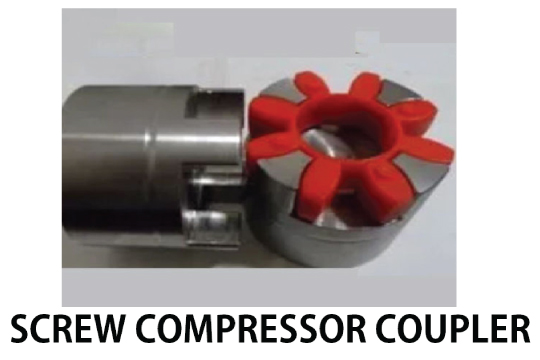-
Call
-
Whatsapp
9825014048
-
Location


Screw Compressor Coupler
Screw Compressor Coupler
Screw compressors are the workhorses of numerous industries, imparting a reliable supply of compressed air for a wide range of packages. These machines function by using converting mechanical energy into compressed air, making them an crucial issue in many commercial tactics. However, the efficiency and overall performance of screw compressors in large part depend on various inner components, certainly one of that's frequently overlooked but equally essential: the screw compressor coupler. In this complete manual, we can explore the arena of screw compressor couplers, delving into their capabilities, kinds, renovation, and the pivotal function they play in ensuring the seamless operation of screw compressors.
A screw compressor coupler is a mechanical device used to connect and transmit strength among the compressor's riding motor and the rotors or screws responsible for compressing the air. This connection is critical for the compressor to feature efficiently, and it should be strong and reliable to resist the vast forces and stresses involved within the compression process.
The Functions of Screw Compressor Couplers
- Power Transmission: The number one characteristic of a coupler is to transmit electricity from the motor to the compressor's rotors. This allows for the rotation of the screws, which compress the incoming air.
- Synchronization:Couplers make certain that the rotors rotate in perfect synchronization, maintaining the proper clearances required for efficient compression.
- Load Distribution:They distribute the load flippantly between the driving motor and the screws, preventing excessive strain on anybody factor and extending the life of the compressor.
Types of Screw Compressor Couplers
Several types of couplers are normally used in screw compressors, every with its own advantages and suitability for unique packages:
- Gear Couplings: Gear couplings use toothed gears to transmit electricity. They are regarded for his or her excessive torque capability and particular electricity transmission.
- Jaw Couplings:Jaw couplings use elastomeric spiders to dampen vibrations and provide flexibility. They are appropriate for applications where surprise absorption is crucial.
- Disc Couplings:Disc couplings use bendy metallic or composite discs to transmit torque. They offer great torsional tension and are regularly utilized in high-velocity applications.
- Grid Couplings:Grid couplings use a grid-like shape to transmit power. They are recognised for their high torque and misalignment skills.
Maintenance and Care
Proper protection of screw compressor couplers is crucial to ensure their reliability and longevity:
- Regular Inspection: Frequent inspections have to be conducted to check for wear, misalignment, or harm. Damaged couplers have to get replaced right away.
- Lubrication:Some couplers may require lubrication to lessen friction and wear. Proper lubrication schedules have to be observed.
- Alignment:Proper alignment between the motor and compressor is critical to prevent excessive pressure on the coupler and make sure green strength transmission.
Screw compressor couplers can be small additives within these powerful machines, but their significance in preserving performance and reliability can not be overstated. They are the linchpin that connects the driving motor to the compression mechanism, making sure synchronized and green operation.
Understanding the capabilities, types, and preservation requirements of couplers is important for industries that depend on screw compressors for their compressed air needs. These unassuming gadgets play a important role in powering precision and reliability in business approaches throughout the globe.


FAQ

Frequently Ask Questions
A screw compressor coupler is a mechanical device used to connect the motor shaft to the compressor's screw element. Its primary function is to transmit rotational motion from the motor to the screw element efficiently. By coupling the motor and screw element, the coupler ensures smooth and reliable operation of the compressor, allowing it to generate compressed air effectively.
Screw compressor couplers come in various types to suit different compressor designs and applications. Common types include flexible couplers, rigid couplers, and magnetic couplers. Flexible couplers provide flexibility to accommodate slight misalignments between the motor and screw element shafts, while rigid couplers offer a more rigid connection for precise alignment. Magnetic couplers utilize magnetic forces to transmit torque without physical contact between the motor and screw element shafts, reducing wear and maintenance requirements.
Proper maintenance of screw compressor couplers is essential to ensure reliable compressor operation. Regular inspection for signs of wear, misalignment, or damage is recommended. Lubrication of coupler components, such as bearings and seals, according to manufacturer guidelines, helps maintain smooth operation and extend the coupler's lifespan. If issues arise, such as unusual noises, vibrations, or coupling failure, prompt troubleshooting and repair are necessary to prevent further damage to the compressor and ensure continuous operation.

